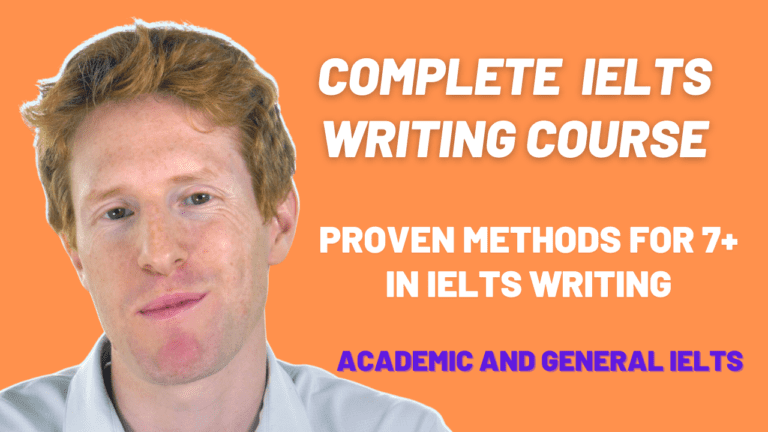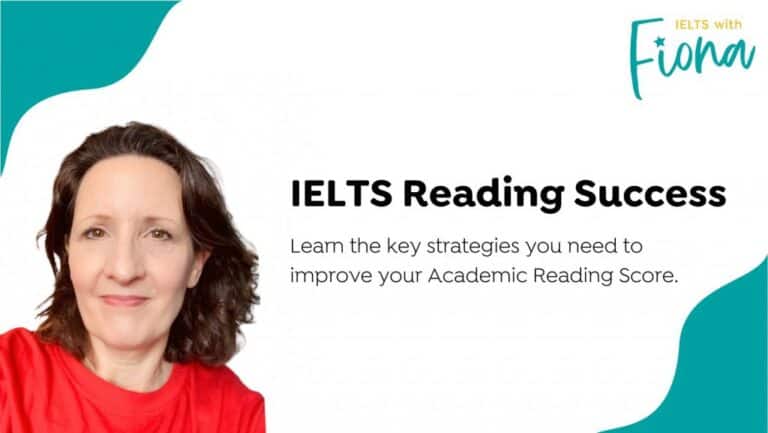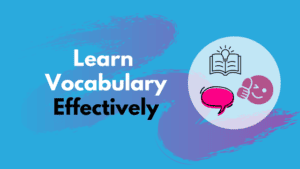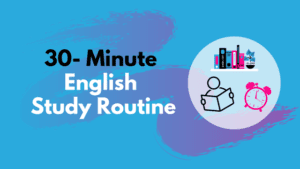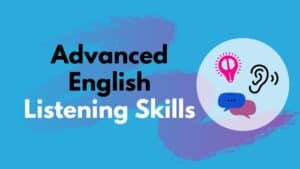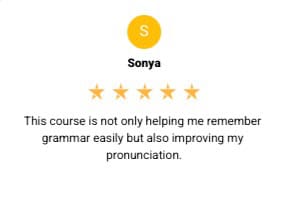What is IELTS and How Do You Prepare for it?
👇 Take this lesson with you! 👇
IELTS stands for The International English Language Testing System and it is a test of English proficiency for people whose mother tongue is not English.
Table of Contents
Who is IELTS for?
So if you want to study or work in an English speaking country, you will need to show the university, college or workplace that is offering a place, that you have a good control of spoken and written English.
You can use IELTS to do that as it is accepted by over 11,000 education and training providers around the world, including by more than 3,000 institutes in the United States.
Likewise, if you want to migrate to a country where English is the native language, such as Canada, Australia, New Zealand, the United Kingdom and the United States, IELTS is one of the tests you can take to show your English is good enough.
Do I need British English for IELTS?
No, you do not need to learn, speak or write British English for IELTS.
IELTS is owned by 3 partner organisations,
- Cambridge English (who write the test)
- IDP (who deliver the test)
- The British Council (who also deliver the test)
Interestingly many people wrongly think it is a test of British English.
It’s not, the clue is in the name, remember it’s the International English Language Testing System, so you can use both US and UK spelling. You can also speak with any accent in the speaking test, as accent is not evaluated.
In addition, in the listening test you will be tested on your ability to understand speakers of many countries, such as South Africa, Australia, Ireland, the United States and so on.
Which is easier, IDP or British Council?
Both organisations deliver exactly the same test.
Cambridge English make the test and it is the same test, with the same criteria and marking system, whether you go with IDP or British Council.
Likewise, examiners for both organisations undergo the same training, so their evaluation will be the same.
So neither one is ‘easier’ than the other.
What is the format of the IELTS test?
The test has 2 modules, Academic and General.
The academic module is the suitable one if you are going to study abroad, or in an English speaking environment, at undergraduate or postgraduate level.
It is often also favoured by many organisations for professional registration purposes (such as in the fields of medicine, nursing, and accounting)
The general module will be needed for those going to English-speaking countries
- to study below degree level (e.g. for secondary education)
- for work experience
- as part of a visa requirement if you are going to migrate to an English speaking country.
The important thing is you must always check with the university or organisation you are applying to, to make sure you are taking the right module.
The test needs to show that you can function well in English in an academic, work or life setting, so each module tests the 4 skills or Reading, Listening, Writing and Speaking.
The Academic module has a special Reading and Writing test.
However, the listening and speaking tests are the same whether you take the Academic or General modules.
For the speaking you will have an interview, face-to-face with an examiner. It lasts 11 to 14 minutes and there are 3 parts.
For more information about the speaking test and how to prepare for it, check out the ‘IELTS test’ section of my website.
Visit the official IELTS website and find out about the test format of the 4 different skills here.

Where can I take IELTS?
You can take IELTS in an IDP or British Council test centre in over 120 countries around the world.
Find a test centre by checking the link below.
You can take the test on a computer or as a paper-based test.
For both modules, the reading, listening and writing are done at a test venue (taking a total of 2.5 hours) and the speaking is done separately in a face-to-face interview with an examiner (taking 11 to 14 minutes).
IELTS has also been doing some tests where the speaking test can be done via video conference. This has been trialed in some countries.
For the paper-based test you will get your score after 13 days, and normally for a computer test it is within 3 to 5 days.
Can I take IELTS online from home?
Yes, in some countries, you can now take the IELTS Academic test online from home.
Bookings are now available for IELTS Online!
Yes it’s official, you can now take the world’s leading English language test at home or from a private location!
You’ll just need to have stable internet, and ensure your setting meets the required technical specifications.
IELTS Online has the same format and duration as IELTS Academic, so it’s very similar to an IELTS test you would sit in a test centre.
- The Listening, Reading and Writing tests are identical to the computer-based test you would do in a test centre.
- The Speaking test is still face to face and is conducted online via video call with an IELTS examiner.
- The main difference is the additional opportunity of choosing where you want to take the test!
IELTS Online also employs the same IELTS multi-layered security processes in pre-test, test day and post-test operations as all other IELTS tests.
- Results are available 3-6 days after taking IELTS Online. All tests are marked by trained IELTS examiners.
If you’re interested in booking an IELTS Online test, just click on the IDP website here
Do note, this is only for the Academic module and is not available in all countries
What score is a pass in IELTS?
First of all, with IELTS, there is no ‘pass’.
It’s a proficiency test, so you get a score from 0 (being the lowest level) to 9 (the highest level).
So the result tells you, and prospective universities or employers, your present ability.
What score do I need to study abroad?
Well it depends, because IELTS do not decide the score you need.
Each individual organisation chooses the IELTS score they will accept.
For example, a university in one city may ask for a band 7, but a university in another city, may accept a band 6.5 for the same subject.
Generally speaking, an IELTS score of 6.0 to 7 is accepted by most UK universities.
Most importantly, make sure you check with the organisation (university, professional body, employer, etc..) the exact score they require you to get.
How to prepare for IELTS
1. Improve your English level
Your main goal should be to improve your overall level of English.
Once you feel you have the right level, then you should focus on exam technique and preparing for the test.
You can check your level by finding an IELTS tutor (in person or online) and asking them to give you a mock test.
The big mistake many students make is to take the test to early with too little preparation.
They may have a band 5 level and think that with 1 month of preparation they will reach a band 7.
You can improve exam technique in 1 month, but you won’t improve your overall English skills by one band, let alone 2 bands in just one month.
Cambridge English recommends 200 hours of guided study to improve your English by one level on the CEFR. This is similar one band in IELTS (not exactly the same but similar) but it gives you an idea.
So take a general English course to get to the level you need first, then take an IELTS course to improve your exam technique
2. Do lots of practice papers
It is so important to get comfortable doing the test, and getting used to the timing and style of questions you will be asked.
So practice doing lots of past papers.
There are plenty of past papers on the IELTS website, the Cambridge English website and the websites by the British Council and IDP
https://ielts.idp.com/spain/prepare/article-free-practice-tests
https://www.cambridgeenglish.org/exams-and-tests/ielts/preparation/
https://takeielts.britishcouncil.org/take-ielts/prepare/free-ielts-practice-tests
You can also buy the Cambridge IELTS Authentic Practice Test
3. Take a mock speaking test

4. Trust the official IELTS partners
Be careful with social media posts for getting information about IELTS.
Trust the official IELTS partners and try to get all the information you need there.
I get the irony of me saying this, as I am not an official source and in no way connected with IELTS or the partner organisations, and this post is not endorsed by them.
So stop reading this and go to the official sites.
Well, maybe finish reading this, and then go check the official sites.
5. Study with others
Studying with others is always a good idea.
You get a sense of community and getting through it together; enjoying the journey together.
Test preparation can be tiring and frustrating, so studying within a community can help you avoid giving up.
6. Take an online course
You can study on your own or take an online course such as the ones in the Keith Speaking Academy.
My flagship course is the IELTS Speaking Success – Get a Band 7+ GOLD and there are also courses for IELTS Writing and IELTS Academic Reading from fellow IELTS teachers Eli and Fiona
How to register for IELTS?
When you are ready you can register to take the exam. There are over 1600 test locations in over 140 countries worldwide.
You can find your nearest test centre on the IELTS website register and then book your test.
By the way, if you have any special requirements, such as learning difficulties, visual difficulties, or medical conditions, you must tell the test centre 6 weeks in advance.
Some students have asked me, I have a stutter can I tell my speaking examiner on the day?
No, you have to tell the test centre in advance, so they can see if they can make special arrangements for you.
On test day
- The day before, rest well.
The test is a marathon, you will need to be well rested so you can concentrate.
The reading, listening and writing will all take place in one session, and the speaking is usually on a separate day.
This varies from country to country so always check with your test centre.
- Arrive early.
- Immerse yourself in English with your phone before the test.
- Relax.
- My tip for people who are nervous about the speaking test is to think ‘I am going to enjoy the test’
Whatever happens, I am going to enjoy it.
- Smile, believe in yourself and do your best.
That’s it.
If you have any more questions or suggestions, please leave me a comment below.

Improve your Speaking Skills with this Free Course
Crack IELTS Speaking Part 1
Learn to Speak with Confidence in Part 1 of Your IELTS Test!
⭐️⭐️⭐️⭐️⭐️
‘It’s such a great course. I’ve learned so many usages for speaking part 1.’
Zu Htet


